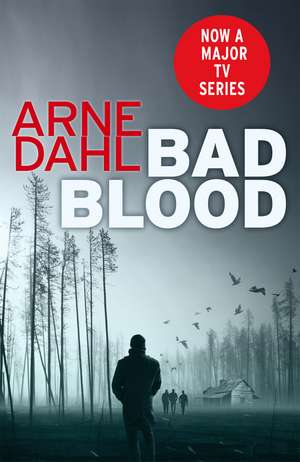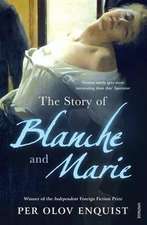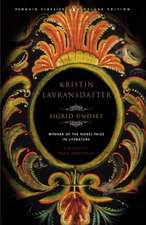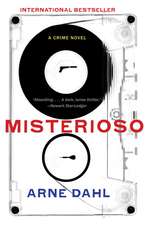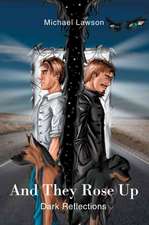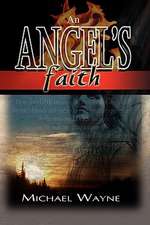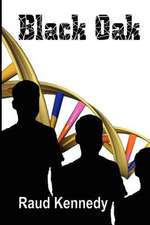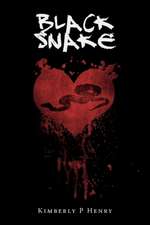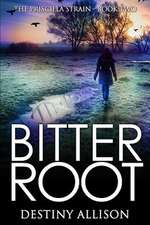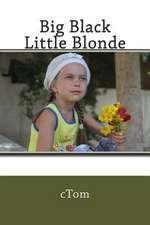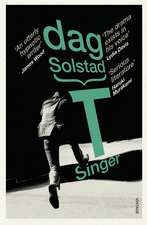Bad Blood
Autor Arne Dahl Traducere de Tiina Nunnallyen Limba Engleză Paperback – 7 noi 2013
| Toate formatele și edițiile | Preț | Express |
|---|---|---|
| Paperback (2) | 53.93 lei 24-35 zile | +20.36 lei 4-10 zile |
| Vintage Publishing – 7 noi 2013 | 53.93 lei 24-35 zile | +20.36 lei 4-10 zile |
| VINTAGE BOOKS – 5 mai 2014 | 127.70 lei 3-5 săpt. |
Preț: 53.93 lei
Preț vechi: 63.88 lei
-16% Nou
Puncte Express: 81
Preț estimativ în valută:
10.32€ • 11.21$ • 8.67£
10.32€ • 11.21$ • 8.67£
Carte disponibilă
Livrare economică 04-15 aprilie
Livrare express 15-21 martie pentru 30.35 lei
Preluare comenzi: 021 569.72.76
Specificații
ISBN-13: 9780099575696
ISBN-10: 0099575698
Pagini: 352
Dimensiuni: 128 x 198 x 30 mm
Greutate: 0.25 kg
Editura: Vintage Publishing
ISBN-10: 0099575698
Pagini: 352
Dimensiuni: 128 x 198 x 30 mm
Greutate: 0.25 kg
Editura: Vintage Publishing
Descriere
Detective Paul Hjelm and his team receive an urgent call from the FBI.
Notă biografică
Arne Dahl is an award-winning crime novelist and literary critic. He lives in Sweden.
(Translated from the Swedish by Rachel Willson-Broyles.)
(Translated from the Swedish by Rachel Willson-Broyles.)
Extras
1
Pain beyond words, he thinks. Now I know what it is.
Learn for life, he thinks, and his gallows-humor laugh is silent. Learn for death, he thinks, and instead of laughter: yet another mute, infernal scream.
As the pain mounts its next attack, he knows with a kind of crystal-clear certainty that he has laughed his last laugh.
The pain is no longer deepening. With what he can still make out as a mixture of satisfaction and terror, he feels that its intensity has reached its peak, and he understands just what process is now under way.
The downward slope.
The graph of pain is no longer rising; it is leveling out, and beyond it he can glimpse the steep incline that will, with the inevitability of a playground slide, end in nothingness. Or—and he fights the thought—with God.
The pores of his body are wide open, small gaping mouths roaring the great Why that he can’t roar himself.
The images start to come to him; he knew they would. They come even as the pain increases to levels he couldn’t have imagined even in his wildest fantasies. He is surprised at the possibilities that have lain hidden within him all these years.
So they do exist.
A person always carries these intense potentials within.
While his entire being explodes in cascade after cascade, the pain seems more and more to shift from his fingers, genitals, and throat to a place outside himself. It somehow becomes general, rising above his body and invading his—and he can’t help thinking of the word—his soul. All the while he tries to keep his mind clear. But then come more images.
At first he fought to maintain contact with the world outside, but now the world outside, beyond the small window, is nothing more than the giant aircraft lumbering past. Now and then the figure of his tormentor glides by, with the deadly tools. Soon enough the roaring planes blend with the images, and now even the planes are transformed into shrieking, infernal spirits.
He can’t gain control over the images, how they come, their order, their structure. He sees the unforgettable interior of the labor room where his son has been born, but he hasn’t been there himself; rather, as his son is born, he hears himself throwing up in the bathroom. But now he is there, and it is beautiful, odorless, soundless. Life goes on, clean and pure. He greets people he recognizes as great authors. He drifts through elegant old corridors. He sees himself making love to his wife, and her expression is joyful in a way he’s never seen. He is standing at a podium; people applaud wildly. More corridors, meetings, conferences. He is on TV, showered with admiring looks. He sees himself writing with a white-hot passion, he sees himself read book after book, pile after pile of papers.
But when the pain pauses and the rumble of the planes brings him back, it strikes him that all he sees is himself reading and writing, not what he is reading and writing. During those short pauses when he can catch his breath, he wonders what this means.
It is clear now that the descent is starting. The pain no longer reaches him. He is fleeing his tormentor; he will be victorious. He even has the strength to spit on him, and the reply is a crunching sound and a small, slight increase in pain. Out of the darkness comes a roaring dragon, and it becomes an airplane that sweeps a lingering veil over a soccer field where his son is casting nervous glances at the sidelines. He waves to him, but his son doesn’t see; he waves more frantically and yells louder, but his son only looks more resigned until he scores a goal for the opposing team, out of distraction or protest.
Then he sees the young woman next to the bookshelf, her impressed glances. They’re walking along the large street, eagerly demonstrating their generation-defying love. On the other side: two completely motionless figures, his son and his wife, and he sees them and stops and gives her a deep kiss. He’s running, working out. The little needle presses down into his scalp again and again, and finally his glorious thick hair is back again. His cell phone rings during a debate at the book fair—another son. Champagne corks pop, but when he gets home, they’re gone.
And he’s reading again, and in a final burst of consciousness he thinks that something out of all he’s read and written ought to fly past, but the only thing he sees is himself reading and writing, and in one last shining second of lucidity that makes him think he is truly dying, he realizes that nothing he has read or written has meant anything. He might as well have done absolutely anything else.
He thinks of the threat. “No one will be able to hear you scream.” Of how he didn’t take the threat seriously. Because he suspected—a final burst of pain stops his last thought.
And so begins the end. His pain fades away. The images come quickly now. It’s as though there’s no time.
He’s walking in the protest march; the police raise their batons above him. He’s standing in a summer pasture, the horse racing toward him. A little grass snake slinks into his rubber boots and winds its way between his toes. His father looks absent-mindedly at his drawing of the enormous snake. The clouds rush by above the edge of the stroller canopy, and he thinks he sees a cat moving around up there. Sweet milk is sprayed over his face. The thick, pale green cord leads the way, and he travels through dark, fleshy canals.
And then he is no longer traveling.
Thinks somewhere: What a sleazy way to die.
Pain beyond words, he thinks. Now I know what it is.
Learn for life, he thinks, and his gallows-humor laugh is silent. Learn for death, he thinks, and instead of laughter: yet another mute, infernal scream.
As the pain mounts its next attack, he knows with a kind of crystal-clear certainty that he has laughed his last laugh.
The pain is no longer deepening. With what he can still make out as a mixture of satisfaction and terror, he feels that its intensity has reached its peak, and he understands just what process is now under way.
The downward slope.
The graph of pain is no longer rising; it is leveling out, and beyond it he can glimpse the steep incline that will, with the inevitability of a playground slide, end in nothingness. Or—and he fights the thought—with God.
The pores of his body are wide open, small gaping mouths roaring the great Why that he can’t roar himself.
The images start to come to him; he knew they would. They come even as the pain increases to levels he couldn’t have imagined even in his wildest fantasies. He is surprised at the possibilities that have lain hidden within him all these years.
So they do exist.
A person always carries these intense potentials within.
While his entire being explodes in cascade after cascade, the pain seems more and more to shift from his fingers, genitals, and throat to a place outside himself. It somehow becomes general, rising above his body and invading his—and he can’t help thinking of the word—his soul. All the while he tries to keep his mind clear. But then come more images.
At first he fought to maintain contact with the world outside, but now the world outside, beyond the small window, is nothing more than the giant aircraft lumbering past. Now and then the figure of his tormentor glides by, with the deadly tools. Soon enough the roaring planes blend with the images, and now even the planes are transformed into shrieking, infernal spirits.
He can’t gain control over the images, how they come, their order, their structure. He sees the unforgettable interior of the labor room where his son has been born, but he hasn’t been there himself; rather, as his son is born, he hears himself throwing up in the bathroom. But now he is there, and it is beautiful, odorless, soundless. Life goes on, clean and pure. He greets people he recognizes as great authors. He drifts through elegant old corridors. He sees himself making love to his wife, and her expression is joyful in a way he’s never seen. He is standing at a podium; people applaud wildly. More corridors, meetings, conferences. He is on TV, showered with admiring looks. He sees himself writing with a white-hot passion, he sees himself read book after book, pile after pile of papers.
But when the pain pauses and the rumble of the planes brings him back, it strikes him that all he sees is himself reading and writing, not what he is reading and writing. During those short pauses when he can catch his breath, he wonders what this means.
It is clear now that the descent is starting. The pain no longer reaches him. He is fleeing his tormentor; he will be victorious. He even has the strength to spit on him, and the reply is a crunching sound and a small, slight increase in pain. Out of the darkness comes a roaring dragon, and it becomes an airplane that sweeps a lingering veil over a soccer field where his son is casting nervous glances at the sidelines. He waves to him, but his son doesn’t see; he waves more frantically and yells louder, but his son only looks more resigned until he scores a goal for the opposing team, out of distraction or protest.
Then he sees the young woman next to the bookshelf, her impressed glances. They’re walking along the large street, eagerly demonstrating their generation-defying love. On the other side: two completely motionless figures, his son and his wife, and he sees them and stops and gives her a deep kiss. He’s running, working out. The little needle presses down into his scalp again and again, and finally his glorious thick hair is back again. His cell phone rings during a debate at the book fair—another son. Champagne corks pop, but when he gets home, they’re gone.
And he’s reading again, and in a final burst of consciousness he thinks that something out of all he’s read and written ought to fly past, but the only thing he sees is himself reading and writing, and in one last shining second of lucidity that makes him think he is truly dying, he realizes that nothing he has read or written has meant anything. He might as well have done absolutely anything else.
He thinks of the threat. “No one will be able to hear you scream.” Of how he didn’t take the threat seriously. Because he suspected—a final burst of pain stops his last thought.
And so begins the end. His pain fades away. The images come quickly now. It’s as though there’s no time.
He’s walking in the protest march; the police raise their batons above him. He’s standing in a summer pasture, the horse racing toward him. A little grass snake slinks into his rubber boots and winds its way between his toes. His father looks absent-mindedly at his drawing of the enormous snake. The clouds rush by above the edge of the stroller canopy, and he thinks he sees a cat moving around up there. Sweet milk is sprayed over his face. The thick, pale green cord leads the way, and he travels through dark, fleshy canals.
And then he is no longer traveling.
Thinks somewhere: What a sleazy way to die.
Recenzii
International Praise for Arne Dahl and Bad Blood
“With dizzying speed Arne Dahl has climbed to the throne of Swedish crime literature. . . . His work is characterized by impartiality, lighthearted humor, epic flow, and poetic precision.” —Dagbladet Information (Denmark)
“One of this year’s most intense thrillers.” —GT (Sweden)
“A highly professional crime novel, and an insightful and thought-provoking social satire.” —Jyllands-Posten (Denmark)
“Bad Blood succeeds due to its clear motive and suspense. It expertly weaves together the American involvement in Vietnam with the current unfolding events in Iraq.” —Aftenposten (Norway)
Praise for Misterioso
“Terrific. . . . Full of twists and turns, blind alleys and sudden assaults, procedural hassles and stakeouts.” —The Providence Journal
“Absorbing . . . A dark, tense thriller.” —Newark Star-Ledger
“Dahl has created a brilliant character and a terrific story. This is a classic cop-shop tale of the old school.” —The Globe and Mail (Canada)
“With dizzying speed Arne Dahl has climbed to the throne of Swedish crime literature. . . . His work is characterized by impartiality, lighthearted humor, epic flow, and poetic precision.” —Dagbladet Information (Denmark)
“One of this year’s most intense thrillers.” —GT (Sweden)
“A highly professional crime novel, and an insightful and thought-provoking social satire.” —Jyllands-Posten (Denmark)
“Bad Blood succeeds due to its clear motive and suspense. It expertly weaves together the American involvement in Vietnam with the current unfolding events in Iraq.” —Aftenposten (Norway)
Praise for Misterioso
“Terrific. . . . Full of twists and turns, blind alleys and sudden assaults, procedural hassles and stakeouts.” —The Providence Journal
“Absorbing . . . A dark, tense thriller.” —Newark Star-Ledger
“Dahl has created a brilliant character and a terrific story. This is a classic cop-shop tale of the old school.” —The Globe and Mail (Canada)
